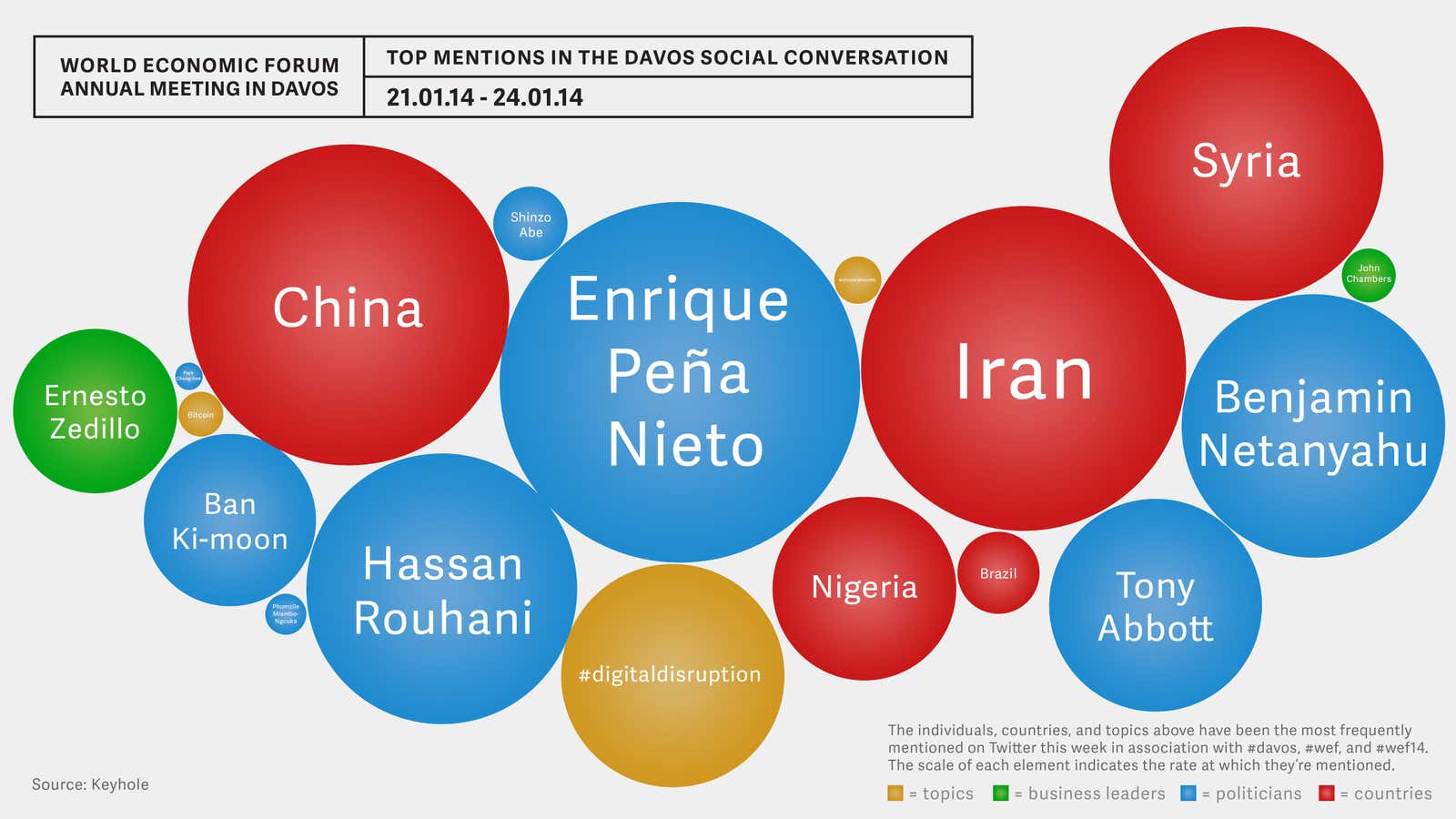The visualization above shows the individuals, countries, and topics most frequently mentioned on Twitter this week in association with #davos, #wef, and #wef14. The scale of each element indicates the rate at which they’re mentioned. View it enlarged here.
Davos drew to a close on Saturday with a few more provocative panels, particularly on the global economic outlook and technology, and a look back at another eventful week in the Alps. Here’s a brief rundown.
STARING DOWN THE ROBOTS The “Rethinking Technology and Employment” panel cut across several of Davos’s biggest themes, and is worth checking out for a sense of this week’s thrust. MIT’s Erik Brynjolfsson, Harvard’s Larry Summers, and more looked at the implications of rapid technological advancement for economies, their workers, and their policymakers at all levels of development.
TAKING BETTER COVER At the panel “Building Resistance to Natural Disasters,” members observed that a third of disaster aid tends to be completely loss due to mismanagement, misallocation, or worse. On either side of dramatic crises, panelists explored how preparation and post-disaster reinforcement, particularly in infrastructure, can contain the next period of fallout. The focus on internal communication and readiness planning echoed Nigerian Finance Minister Ngozi Okonjo-Iweala’s statements yesterday in support of self-sufficient economic development and less reliance on foreign aid.
EMERGING SURGE When Larry Summers waves his iPhone at a Davos dinner audience to illustrate your region’s rising mobile phone penetration and advocates your economic potential, a bit of momentum has swung your way. Such is the case for emerging markets in Africa, looked to by many as opportunities to make up for faltering growth in the BRICS and other past Davos darlings. Look to the “Africa’s Next Billion” panel covered in the Wednesday recap and the Thursday vision for internal, self-sustaining African development laid out by Nigerian Minister of Finance Ngozi Okonjo-Iweala (a worthy Twitter follow on this front) to come to grips with a shift that may dominate the panels next year even more.
EUROPE’S BOOTSTRAPS Davos’s final day Saturday saw a couple of panels and significant analysis spent on the future of Europe as it tentatively looks to move on from the darkest days of the euro crisis. The Guardian’s Day Four live blog offers a good survey of the statements by Draghi, Carney, Schauble, and other heavyweights. Chris Hughes and Rob Cox of Reuters Breakingviews survey the highly guarded optimism of Davos leaders looking at “the quality rather than the pace of the recovery” and counting on trends to hold.
OH, THE HUMANITIES In the New York Times, Rachel Donadio recaps Davos with an eye on the various cultural leaders and organizations seeking to have their voices heard among the business, geopolitical, and other powerbrokers: “But it is also increasingly a place where leading museum directors, arts leaders, and university presidents clamor to be heard above the engines of capitalism, to make a case for culture and the humanities as a vital part of the global economy and where ideas take root,” she writes. Elif Shafak, the most widely-read woman writer in Turkey, echoes this sentiment on the WEF’s blog, arguing that the inward reflections inherent in novels serve as a necessary counterweight to the dualities and side-taking of politics.
MAKING A MOVE Director of the MIT Media Lab Joi Ito announced a Chevron grant for Fab Labs, which give innovators and learners access to industrial-grade fabrication and electronics tools, that he placed in the context of the battle for the U.S. to close its skills gap in science, technology, engineering, and math (STEM).
ENERGY TRANSITIONS The Daily Beast’s Christopher Dickey offers a look at the natural gas market and how the U.S. has upended price trends as the shale extraction shift has arrived in recent years.
QUANTIFIED SELF We’ll leave you with this Economist infographic breaking down the Davos delegates on various metrics, including a striking look at the dominant ages and gender represented as well as a delegate gap emerging markets will be looking to close along with an attention gap.
This article was produced on behalf of Bank of America by the Quartz marketing team and not by the Quartz editorial staff.
